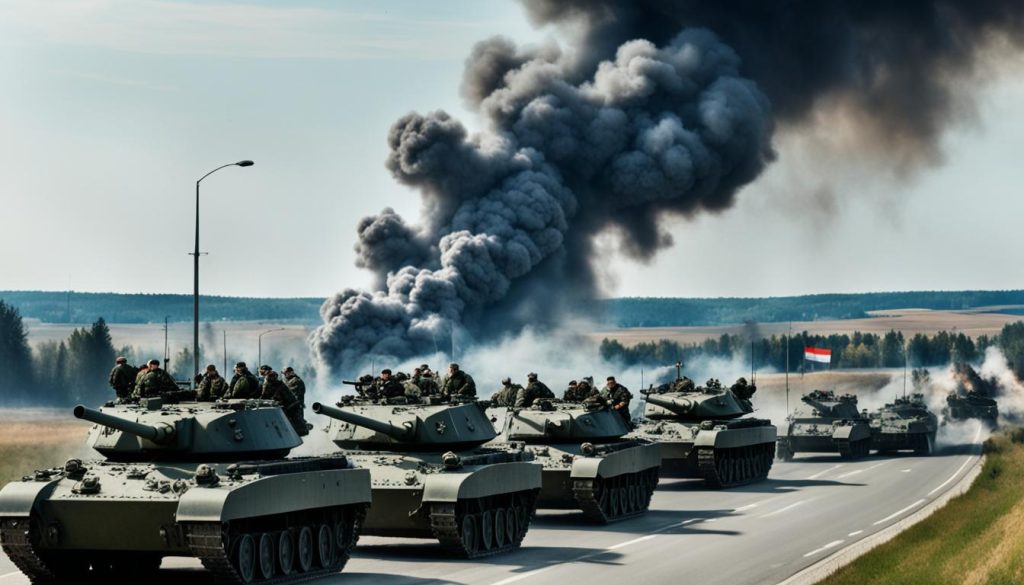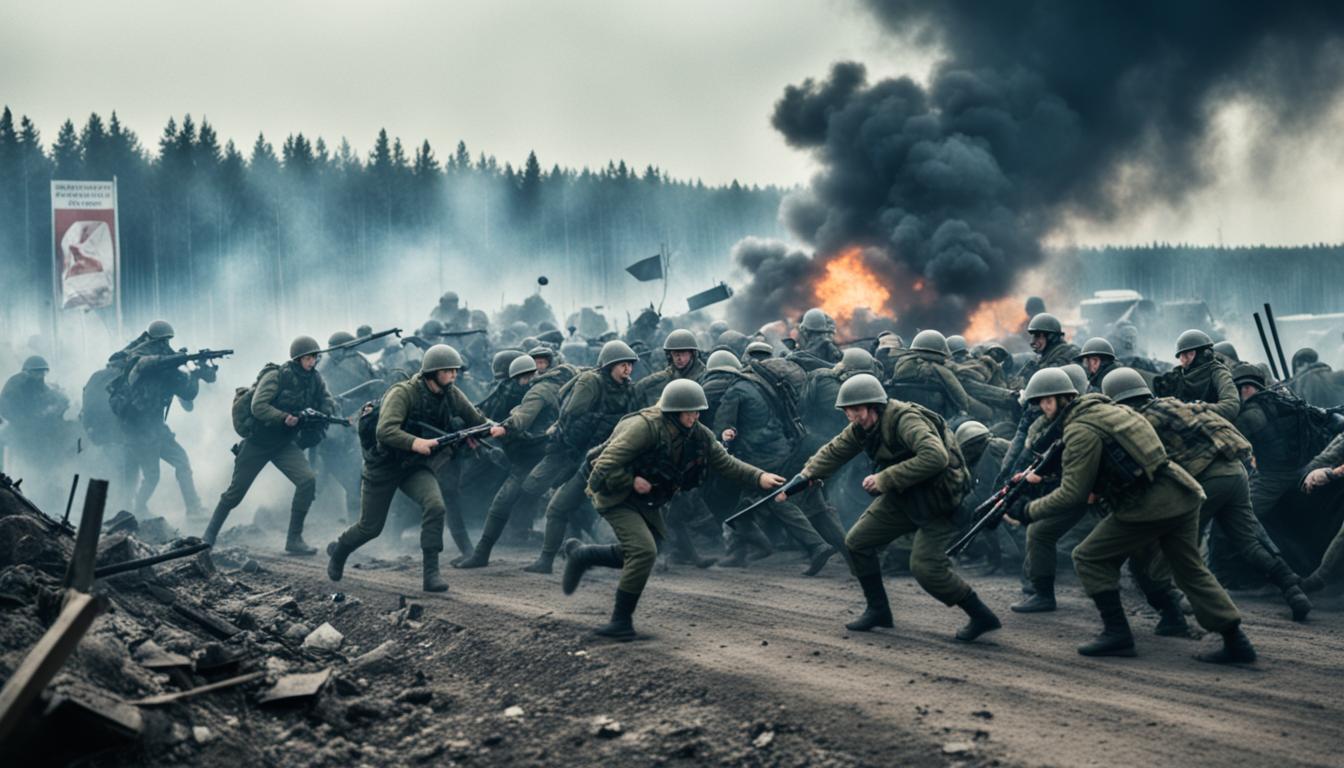The sudden invasion of Poland by Wagner mercenaries has caused a major crisis in Eastern Europe. This action by the Russian paramilitary group has made tensions worse, leading to serious questions about security. Poland and its allies are now trying to figure out what this means, while the world watches closely.
The world is closely watching as this situation develops. The Polish Ministry of National Defence and NATO are making statements. Everyone is trying to understand what this violation means for the future.
Key Takeaways
- The sudden incursion by the Wagner Group into Poland stands as a significant geopolitical crisis.
- Concerns over eastern Europe security have heightened following the aggressive Poland border breach.
- The motives and future actions of Wagner mercenaries are under rigorous examination.
- Assessing NATO responses is crucial in determining the alliance’s stance on collective defence.
- This development could foreshadow a broader recalibration of international security dynamics.
The Unfolding Scenario: Wagner Group’s Incursion into Polish Territory
The Wagner Group’s recent invasion into Poland brings up big issues. They work as a private military company. This invasion breaks international rules and asks questions about countries’ rights and the use of mercenaries in conflicts.

Understanding the Wagner Group’s Motives
Why did the Wagner Group invade? It seems they want to shake up global peace and test diplomacy’s strength. Their actions might be a way to get around usual international laws, by fighting indirectly.
Immediate International Reactions to the Invasion
The world reacted quickly. The UN Security Council met urgently to talk about Poland’s rights. European countries demanded the Wagner Group leave and respect the rules. This shows a strong, united response from the globe.
Military Strategies and Implications of the Conflict
Poland and its NATO friends are moving their military to protect their land. The fight is between Poland’s defense strategies and the Wagner Group’s bold moves. It’s like a big game of chess, with each action watched by the world.
| Aspect | Poland and NATO’s Response | Wagner Group’s Tactics |
|---|---|---|
| Strategic Goal | Preservation of Territorial Sovereignty | Expansion of Influence |
| Diplomatic Stance | Upholding International Law | Challenging Global Diplomacy |
| Resource Allocation | Defensive Military Strategy | Offensive Private Contracting |
| International Support | Backed by NATO and EU Nations | Ambiguous due to PMC Nature |
Geopolitical Ramifications of the Wagner Group Invading Poland
The Wagner Group’s move into Poland highlights NATO’s eastern flank’s vulnerability. This sudden act has raised concerns in Europe and beyond. It shows the complex and tense Russia-NATO relations. We must look at its impact on both military positions and the area’s economic health.
The Impact on NATO-Russian Relations
Russia-NATO relations are under heavy strain, with dwindling trust and fears of a defence escalation. NATO is rethinking its stance towards Eastern allies. It aims to boost military preparedness and build stronger ties against Russian sway.
Escalation of Military Presence in Eastern Europe
The current situation has triggered a major military expansion at NATO’s eastern borders. Experts warn this defence escalation could destabilise the area further. They urge careful actions to avoid sparking larger conflicts.
Economic Consequences for the Involved Nations
This conflict could lead to significant economic sanctions. Key trade paths and energy supplies are at risk. This forces nations to quickly find other energy sources. The fallout might affect global and local economies through these sanctions and the quest for energy solutions.
| Economic Factor | Pre-Invasion State | Post-Invasion Projected Impact |
|---|---|---|
| Trade Volumes | Stable with growth potential | Possible decrease and redirection of trade flows |
| Energy Supply Stability | Dependent on Russian resources | Urgent diversification and increased use of renewables |
| Foreign Direct Investment | Expanding in Eastern Europe | Risk aversion and potential withdrawal |
| Currency Valuation | Relatively stable | Depreciation due to geopolitical risks |
As nations face these geopolitical shockwaves, they focus on strong military defences, economic stability, and clever diplomacy. The future stability of Eastern Europe relies on global leaders. They must skilfully handle these difficult times.
Conclusion
The goal to solve armed conflicts and bring back peace is key for the world. Looking at the Wagner Group’s actions in Poland shows the big problems Eastern Europe faces. It makes it clear that peace talks and smart diplomacy are crucial to stop more crises.
To keep peace, research centres and diplomatic actions play a big role in making plans for solving conflicts. By learning from what’s happening on Poland’s border, we must do better in diplomacy and strengthen friendships between countries. Doing so can help make Eastern Europe stable, not a place of worry.
The story ends with a focus on how to calm things down and make peace last. The world has to show it can solve conflicts together, even when things seem broken apart. It’s vital to stick together, follow international rules, and respect countries’ borders. This event teaches us how important it is to work hard for a peaceful future in Eastern Europe. That’s key for peace everywhere.
FAQ
What recent actions have the Wagner Group taken in Poland?
The Wagner Group has breached Poland’s border. This act raises concerns of a big geopolitical crisis. It has also sparked talks about security in Eastern Europe.
How has NATO responded to the Wagner mercenaries’ incursion?
NATO condemned the invasion and is working with Polish officials. They are putting together detailed plans as the situation evolves.
What are the possible motives behind the Wagner Group’s invasion into Polish territory?
The goals of the Wagner Group are not fully known yet. Experts think they might want to test NATO’s defences, disturb peace, and change the political scene in Eastern Europe.
How has the international community reacted to the military invasion by a private military contractor into Poland?
World leaders and the EU are very worried. They want respect for the law and protection of lands. Talks have begun to solve this conflict.
What military strategies are being deployed by Poland and NATO?
Poland and NATO are using defensive plans to stop more attacks. They aim to keep the country safe. The exact methods are secret but include more soldiers.
What impact will there be on NATO-Russian relations due to the Wagner Group’s action?
This invasion will make tensions worse. It could lead to more military buildup on NATO’s side and change NATO’s relations with Russia a lot.
What are the economic consequences predicted for Poland and potential global impacts?
This conflict might cause sanctions and trade problems. It could also make energy prices unstable, affecting Europe and maybe the world.
Could the Wagner Group’s incursion into Poland lead to broader geopolitical ramifications in Eastern Europe?
Yes, this act could change military plans and policies. It might also affect relations and economics in Eastern Europe and further.
What measures are being taken to resolve the conflict between the Wagner Group and Poland?
International groups want peace talks and are trying to calm the situation with diplomacy. Solving this conflict is hard and ongoing.
How could this geopolitical crisis shape the future of Eastern Europe?
This invasion marks a big change. It could lead to more military action in Eastern Europe, changes in alliances, and stronger international responses to crises.



